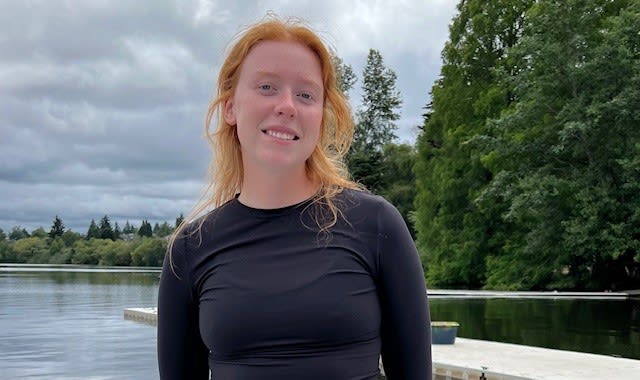
[4 min read]
In this article:
- Genu valgum is the medical term for knock-knee, an orthopedic condition that isn't life threatening, but can cause complications if not addressed.
- Guided-growth surgery involves the insertion of small metal plates that help correct the legs' alignment by encouraging bone growth in a more natural position.
- Learn more about patient Claire Banasky (in photo above) who had the corrective surgery as a child, and today is a coach and Divison 1 college athlete.
Books and movies are filled with young characters described as knock-kneed and awkward. But for many kids, knock-knee is a real orthopedic condition that can have long-term consequences if it’s not addressed.
Knock-knees, or genu valgum, is when a person's knees angle inward giving the appearance of the knees touching while the ankles remain apart. While not life-threatening, if left untreated knock-knees can have long-term complications such as uneven stress on parts of the leg, leading to chronic knee pain, difficulty in walking, and even the development of osteoarthritis in the knees. It can also sometimes cause self-esteem issues, particularly during critical development years when many kids struggle with body image.
On a recent special edition of KING 5’s New Day Northwest, Providence Swedish patient Claire Banasky, 20, appeared with pediatric orthopedic surgeon Laurel Saliman, M.D., to discuss her experience with the condition and how surgery with Dr. Saliman changed her life.
When Claire was a little girl, as she grew her mom noticed something was off with the alignment of her legs. When Claire was 11, she broke her foot and saw Dr. Saliman, who was quickly able to recognize Claire’s condition.
“[The condition] is not particularly rare in my world,” says Dr. Saliman. “It’s sort of the opposite of bowlegs. There’s a natural progression that kids go through — from bowlegged when they are young to straight by the age of four. At four, they start to get that knock-kneed positioning, and then by the age of 8 they get their normal leg position. If they are still knock-kneed by the age of eight, we start to think maybe we should do something, and the generally accepted treatment is surgery.”
Dr. Saliman recommended a corrective surgical procedure known as guided-growth surgery. This minimally invasive technique involves the insertion of a small metal plate on the inner side of the knee, near the knee's growth plate. This plate helps to correct the alignment of the leg by encouraging the growth of the femur or tibia in a more natural position as the child continues to grow.
“I had two surgeries, one when I was 11 [to put the plates in] and the second when I was 12 or 13 [to remove the plates],” says Claire. “We did the surgery at that age because I was still growing.”
“When I was told surgery was an option, I was definitely a little anxious. I didn’t really understand the difference between my surgery and something like surgery for cancer. But Dr. Saliman was helpful in explaining it for my 11-year-old brain. My mom was also very helpful and so I was okay with the surgery once I understood what was going on,” says Claire.
“The surgery (which was performed at the Swedish Orthopedic Institute) went pretty smoothly. The surgical team from Swedish Pediatric Specialty Care was fantastic to work with, especially Dr. Saliman,” says Claire. “They had child life specialists come talk to me. The anesthesiologist also came and talked with me. She helped me with my breathing mask and put stickers on it. It was such a kid-friendly space. Everyone was really cool and made sure I could feel a little bit more comfortable. They also made my recovery time go really smoothly.”
Today, Claire is a junior at the University of Portland, where she is studying integrative health and wellness. She’s also a member of the school’s Division 1 rowing team. During summers, Claire coaches young rowers and teaches sailing at Seattle’s Green Lake. She says her experience with surgery informs how she connects with the young people she coaches.
“I think that having that experience just makes me a little more empathetic with my athletes and what they're going through — especially with injuries,” says Claire. “Having my own real-life experience is definitely helpful when being able to communicate with them and particularly with young people because it happened to me when I was so young.”
Learn more and find a physician or advanced practice clinician (APC)
If you have questions about your child’s health and wellness, Swedish Pediatrics can help. You can contact Swedish Primary Care to schedule an appointment with a primary care physician or advanced care clinician. If you or a child has symptoms, you can connect virtually with a member of your care team who can review the symptoms, provide instruction and follow up as needed. With Swedish ExpressCare Virtual you can receive treatment in minutes for common conditions such as colds, flu, urinary tract infections, and more. If you don’t have a doctor, use our provider directory to find a specialist or primary care physician near you.
Information for patients and visitors
Additional resources
At Providence Swedish, the best care for kids of all ages
Keep your young athlete safe. Know the signs of a concussion.
Routine mental health talks with kids help make home a stigma-free zone
Growing Up Safely: Immunizations + Health | Talk with a Doc Podcast
This information is not intended as a substitute for professional medical care. Always follow your healthcare professional's instructions.
Providence Swedish experts in the media
Follow us on Facebook, Instagram and X.
About the Author
More Content by Swedish Pediatrics Team























